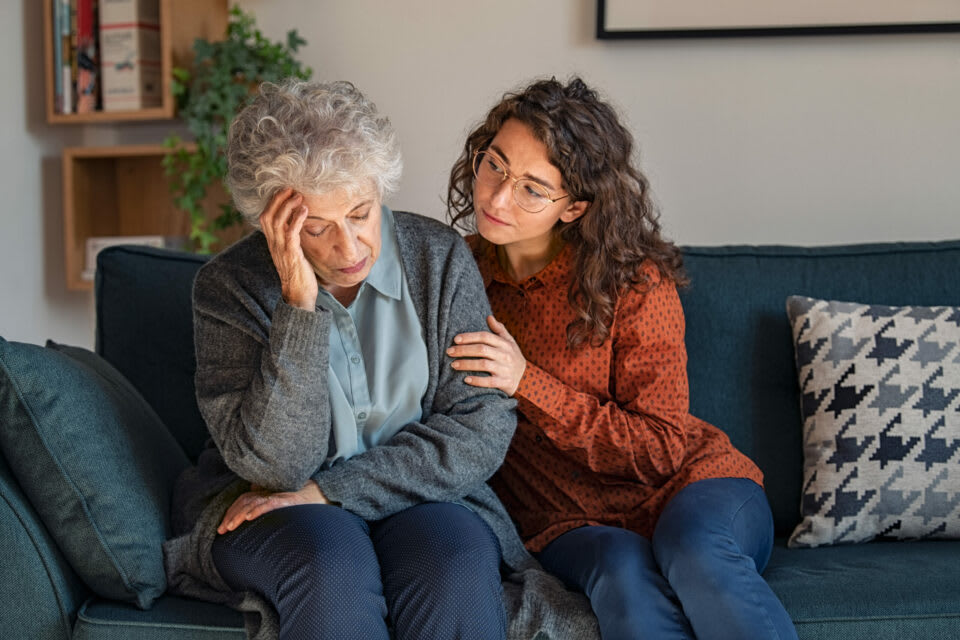
Dementia and Paranoia: Triggers and Tips

Paranoia is a common symptom of dementia, and it’s one of the hardest to deal with. Though there isn’t a definitive stage of dementia when paranoia appears, it’s most often observed in the later phases. Identifying common triggers and following a few useful tips can make dementia-related paranoia more manageable. However, if paranoia and other symptoms of dementia become too severe, long-term solutions like memory care may be the best option.
Let our care assessment guide you
Our free tool provides options, advice, and next steps based on your unique situation.
Key Takeaways
- Paranoia is often a symptom of dementia due to delusions and forgetfulness caused by the major neurocognitive disorder.
- Paranoia is most common in the later stages of dementia, though it depends on the person and which part of the brain is affected.
- Caregivers should remember to be patient, understanding, and observant when helping loved ones dealing with paranoia.
- Memory care is an effective care solution when a loved one’s cognitive functioning declines and paranoid episodes become unmanageable for them and caregivers.
When do seniors with dementia become paranoid?
Paranoia presents itself in those with dementia when certain areas of the brain are damaged. This can cause delusions, which commonly incites paranoia due to feelings of confusion, anxiety, and agitation.
Maureen Nash, M.D. and medical director of Providence ElderPlace in Portland, Oregon, regularly counsels families with loved ones experiencing paranoia. She affirms paranoia is often secondary to something else. One example is when a senior is convinced that they’re being physically abused. “When someone with dementia is experiencing the normal aches and pains that come with aging, [they] might assume that [they have] been beaten up because [their] memory loss prevents [them] from forming any other logical conclusion,” explains Dr. Nash.[01]
Though paranoia is commonly seen in people with Alzheimer’s, it’s also often observed with Lewy body dementia. Lewy body dementia is caused by protein deposits developing in the brain’s nerve cells, which can result in delusions and visual hallucinations.[02] Vascular dementia and paranoia are linked as well, due to conditions like strokes disrupting blood flow to the brain.[03]
Is paranoia a symptom of dementia?
Paranoia can be a symptom of dementia, but it has to be accompanied with other symptoms to make a diagnosis.[04] Paranoia by itself is not a reason to diagnose someone with dementia, but it is a common side effect.
Why do dementia patients become paranoid?
There are a couple of reasons why dementia can lead to paranoia:
Daily life stops making sense. The biggest reason why dementia patients become paranoid is because normal daily life stops making sense. If something doesn’t make sense to someone with dementia, they may react with paranoid behavior, even for everyday occurrences.
District court judge Cynthia Kent spoke to Health Central about her 68-year-old husband and how something as simple as her going to work made him paranoid. “All of a sudden, it was like his mind was just not working properly,” she said. She then recalled him following her to court, to the bathroom, and the dentist because he became convinced she was having an affair.[05]
Forgetfulness fuels paranoia. It’s important to note that as forgetfulness intensifies with dementia, your loved one might become paranoid when they start to misplace essentials. Forgetfulness can lead to paranoia in many situations such as the following:
- Forgetting where something was placed, making them think someone is moving or taking their things on purpose
- Forgetting their caregivers or someone new they were introduced to, causing them to be skeptical of that person’s intentions and believe they are a stranger
- Forgetting directions or processes might make them think you’re trying to trick or deceive them

Let our care assessment guide you
Our free tool provides options, advice, and next steps based on your unique situation.
At what stage of dementia does paranoia appear?
There isn’t one exact stage paranoia appears in people with dementia. Dr. Nash notes, “It all depends on which part of the brain is impacted, in what order the brain problems develop, and how the disease progresses over time.” The stage when paranoia manifests and its severity varies depending on the person.[01]
However, paranoia is more commonly observed as a person’s cognitive impairment becomes more severe. A study from the National Library of Medicine found forms of dementia that affect mental health and behavior — such as Lewy body dementia — may cause paranoia in earlier stages. Meanwhile, other forms of dementia, like Alzheimer’s, may experience paranoia during its later stages.[06]
You should speak with your loved one’s medical care team if your loved one has been diagnosed with dementia and is experiencing paranoia or other behavioral symptoms.
How to deal with paranoia in dementia patients
Paranoia is one of the hardest behavioral challenges when caring for someone with dementia. It’s one reason why family caregivers may end up looking for professional memory care for their loved ones.
Kathleen Allen, an eldercare consultant with over 20 years of experience and a master’s degree in social work, stresses how important it is to make your loved one feel understood. Their paranoia may be due to delusions, but it’s vital to still acknowledge how they’re feeling.[07] Try to remember that your loved one is not only coping with memory loss, but may also feel uncomfortable and unsafe due to their paranoia.
Remember that as a caregiver, your health is important too. As symptoms progress, it may be time to consider professional help, such as memory care.
Here are seven tips to help you handle your loved one’s paranoia:
1. Don’t argue
When your loved one is experiencing feelings of paranoia, calmly affirm your loved one’s feelings without being dismissive or aggressive.[08] Allen suggests providing validation to any fears they have. For example, if they believe an intruder may be in their home, say something like, “That must be scary to think someone is in the house with you.”[07] Doing so makes them feel heard and understood, while avoiding any frustration that may arise from you not believing them.
2. Be patient
It may be difficult, but by staying patient you can avoid escalating situations.[09] This is especially true if your loved one accuses you of something, such as stealing or that you’re trying to trick them. Though you know it isn’t true, it’s imperative to remain calm and not become emotional from the accusation.
3. Reassure your loved one
Remind your loved one you’re there to help them and have their best interests in mind.[09] Remember that episodes of paranoia frequently arise from fear or frustration, so let them know they’re safe and you’re there for them. Acknowledge and empathize with them, demonstrate your support, and tell them you’re there to help.
4. Utilize distractions
Sometimes these tips aren’t always effective for diffusing situations. In such cases, it can be beneficial to distract them by moving into a different room, pivoting to a new conversation topic, listening to music, or looking at photos together. Additionally, you can try suggesting a walk to clear their mind and coming back later once they’ve calmed down.
5. Keep track of changes in behavior
You may notice your loved one isn’t keeping things in usual spots or is becoming more skeptical of their normal routines and care. Seeing changes in behavior could help you identify paranoid patterns or triggers. For example, maybe lighting through the window at a particular time of the day creates a shadow, and that’s why they often think someone else is in their home. By recognizing this, you can close the curtains or ensure your loved one isn’t in that room at that time.
6. Check with a doctor
Though dementia does cause changes to the brain, certain drugs can also create feelings of paranoia as a side effect. By talking with your loved one’s physician, you can determine if prescribed medicines are the cause.[08] Medical issues such as impaired hearing, eyesight, and dental health may also contribute to delusions and paranoia, so be sure to have regular checkups.
7. Prioritize self-care
As a caregiver to a person with dementia, it’s essential to maintain self-care practices. Caring for a loved one, especially when their condition becomes severe, can take a toll on you and contribute to caregiver burnout. Your mental and physical health is as vital as your loved one’s.

Talk with a Senior Living Advisor
Our advisors help 300,000 families each year find the right senior care for their loved ones.
Consider long-term memory care
Caring for someone with dementia can be a full-time job, and that may not be feasible for you. Moving your loved one to long-term memory care can offer a more supportive living environment that’s equipped to handle the more challenging dementia behaviors. Memory care also brings more opportunities for socialization. Being around others can support brain health, help maintain focus, and create feelings of inclusion, all of which can ward off episodes of paranoia.
Senior living communities with secured memory care units also offer an environment geared toward the safety of people with memory loss challenges. They may feature easy to navigate pathways, large signage, and calming aromatherapy scents to create a relaxing atmosphere to reduce stress, anxiety, and paranoia.
Finding memory care for seniors with dementia and paranoia
It can be highly emotional to consider pursuing memory care for your loved one. Reach out to A Place for Mom’s Senior Living Advisors for help finding care that’s a good fit for your unique situation. They can also provide advice on senior care, connect you with prospective communities, and even set up community tours – all at no cost to you.
Thomas, M. (2024). Paranoia and memory loss. Understanding and Managing Delusional Behavior.
McKeith, I. (2004). Dementia with Lewy bodies, Dialogues in Clinical Neuroscience, 6:3, 333-341.Taylor & Francis Online.
Matcau, D. (2003). Vascular dementia.Longer Life.
Waldö, M. L., Gustafson, L., Passant, U., & Englund, E. (2015). Psychotic symptoms in frontotemporal dementia: a diagnostic dilemma?. International Psychogeriatrics, 27(4), 531-539. International Psychogeriatrics Association.
Halpert, J. (2021, January 28). Dementia, psychosis, and relationships. Health Central.
Emmady, P., Schoo, C., & Tadi, P. (2022, November 19). Major neurocognitive disorder (dementia). U.S. National Library of Medicine
Allen, K. (2021, July 7). Top 5 tips to manage Alzheimer’s hallucinations and delusions. BrightFocus Foundation.
National Institute on Aging. (2017, May 17). Alzheimer’s caregiving: coping with hallucinations, delusions, and paranoia.
National Institute on Aging. (2017, May 17). Alzheimer’s caregiving: managing personality and behavior changes.
Senior living options in all states
The information contained on this page is for informational purposes only and is not intended to constitute medical, legal or financial advice or create a professional relationship between A Place for Mom and the reader. Always seek the advice of your health care provider, attorney or financial advisor with respect to any particular matter, and do not act or refrain from acting on the basis of anything you have read on this site. Links to third-party websites are only for the convenience of the reader; A Place for Mom does not endorse the contents of the third-party sites.
Make the best senior care decision
Make the best senior care decision